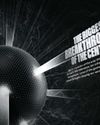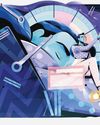
YOUR WORK IS CENTRED ON PSYCHEDELIC DRUGS. WHAT DOES THE TERM ‘PSYCHEDELIC’ ACTUALLY MEAN?
Psychedelics was a term developed back in the 1950s by people like Aldous Huxley [the author of The Doors Of Perception]. Psychedelic means mind-manifesting. Typically, we talk about psychedelic drugs as drugs that produce altered states of perception and consciousness, such as magic mushrooms, LSD, mescaline, peyote, DMT, ayahuasca. It turns out they all work on a particular receptor in the brain called the serotonin 5HT2A receptor.
WHAT IS THE ROLE OF THE SEROTONIN 5HT2A RECEPTOR?
The human brain is loaded with them, all in the parts of the brain where you do your thinking and your analysis of yourself. They tie together your consciousness with your other senses. They’re really in that circuit that kind of defines what you are as a human being. When you stimulate those receptors with psychedelics, you change the way the brain processes things.
The brain is an amazing organ; it’s the most efficient computer, 10 times more energy efficient than any computer we’ve yet invented. One of the reasons that the brain is so efficient is that it learns very quickly what to predict. Brains make inferences and we live through those inferences because it’s just so much more efficient. If your brain had to update every, say, 15 milliseconds, everything that’s gone into it, that would consume enormous amounts of energy. So, the brain basically looks for change. It sees what’s there and listens to what’s there, and then when things change, it takes notice. The rest of the time, it just says that things haven’t changed.
Esta historia es de la edición June 2020 de BBC Focus - Science & Technology.
Comience su prueba gratuita de Magzter GOLD de 7 días para acceder a miles de historias premium seleccionadas y a más de 9,000 revistas y periódicos.
Ya eres suscriptor ? Conectar
Esta historia es de la edición June 2020 de BBC Focus - Science & Technology.
Comience su prueba gratuita de Magzter GOLD de 7 días para acceder a miles de historias premium seleccionadas y a más de 9,000 revistas y periódicos.
Ya eres suscriptor? Conectar

THE WORST IDEAS OF THE 21ST CENTURY
NOT ALL IDEAS CAN BE HITS. ALONGSIDE GROUND-BREAKING INNOVATIONS, 21ST-CENTURY SCIENTISTS HAVE HELMED THEIR SHARE OF WILD TECH FLOPS, DUBIOUS THEORIES AND OVERHYPED BREAKTHROUGHS. HERE ARE THE BIGGEST TO FORGET

10 IDEAS THAT WILL SHAPE YOUR NEXT 25 YEARS
Predicting the future is considered a fool's game. But it's one many of us like to play.

THE BIGGEST BREAKTHROUGHS OF THE CENTURY
We're a quarter of the way into the new century. To mark this milestone, we asked the UK's top minds to highlight some of the game-changing scientific breakthroughs shaping our world since the year 2000

DO THE SCIENCE COGNITIVE SHUFFLE
Trouble sleeping? A lot on your mind? Use this trick and sedate your synapses

WHAT DETERMINES HOW MANY ABS I CAN GET?
Assuming you're a human being, you have exactly the same number of abs as everybody else: two.

HOW CAN I IDENTIFY MY PSYCHOLOGICAL BLIND SPOT?
In the 1950s two American psychologists, Joseph Luft and Harrington Ingham, proposed a way of thinking about psychological blind spots - things you don't know about yourself - that they called the 'Johari Window' (the term is a combination of their first names).

How can I change my personality?
Want to become more confident, extroverted or assertive? Science shows that with a few simple changes, you can unlock your best self

Could your cosmetics be harming your health?
Cosmetic companies are phasing out microplastics and so-called 'forever chemicals' to help protect consumers.

extraterrestrial US Congress is talking about activity again. Is the truth really out there?
Despite several testimonies, the question remains frustratingly unanswered

Map of 100 million human body cells revealed
Over three dozen new studies mark significant milestone towards complete Human Cell Atlas